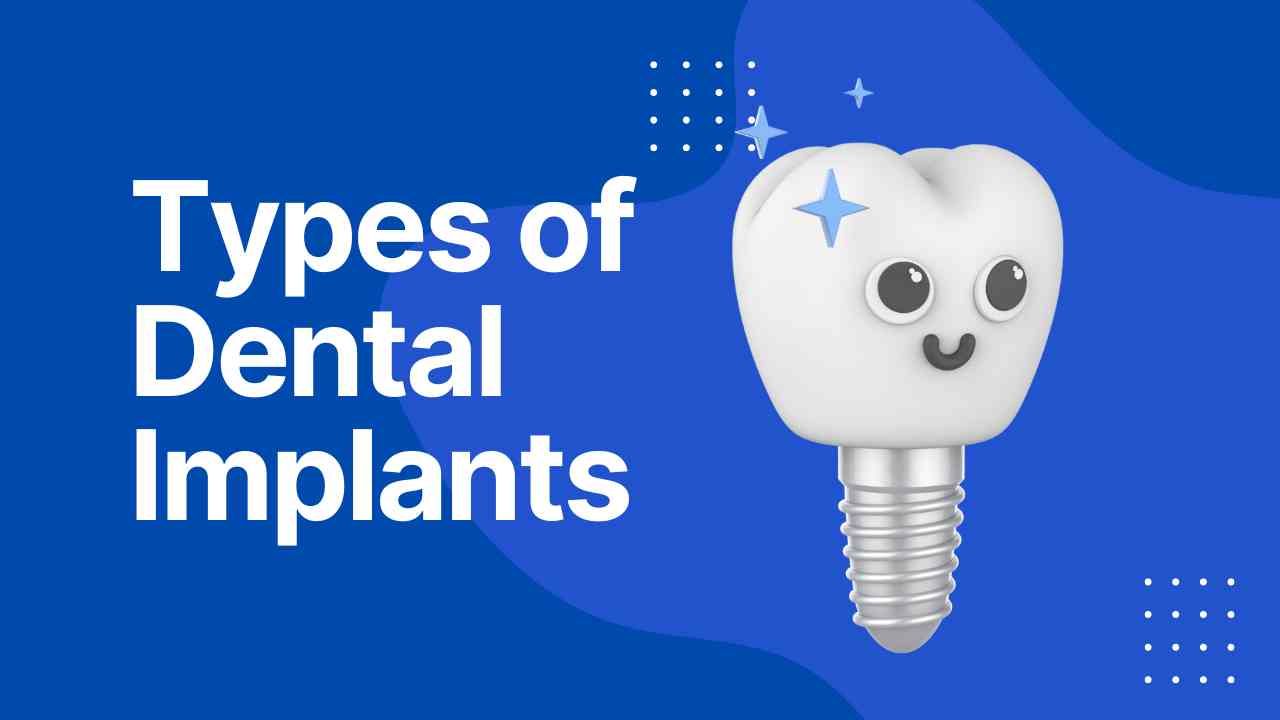Types of Dental Implants

What Are Dental Implants?
Dental implants are artificial tooth roots that provide a strong foundation for fixed or removable replacement teeth. They are designed to blend seamlessly with natural teeth, making them an ideal choice for restoring a complete smile.
Importance of Dental Implants in Modern Dentistry
In today’s dentistry, dental implants are considered a revolutionary solution. Unlike dentures or bridges, they offer superior stability, functionality, and a natural appearance, improving both oral health and confidence.
Why Choose Dental Implants Over Other Options?
Dental implants prevent bone loss, maintain facial structure, and eliminate the inconvenience of removable dentures. They are long-lasting and feel just like natural teeth.
Types of Dental Implants
Endosteal Implants
Endosteal implants are the most common type of dental implant. These are surgically placed directly into the jawbone.
Features and Benefits
- Made from titanium, which integrates easily with the jawbone.
- Provides strong support for crowns, bridges, or dentures.
Procedure Overview
The implant is inserted into the jawbone, and after a healing period, a crown or other restoration is attached.
Subperiosteal Implants
These implants are placed under the gum but above the jawbone, making them ideal for patients with insufficient bone density.
When Are They Used?
Subperiosteal implants are recommended for patients who cannot or prefer not to undergo bone grafting.
Benefits and Limitations
While they are less invasive, they may not offer the same stability as endosteal implants.
Zygomatic Implants
These are placed in the cheekbone (zygomatic bone) instead of the jawbone.
Special Cases for Zygomatic Implants
They are used in cases where the upper jaw lacks sufficient bone structure.
Advantages and Challenges
Although they provide a secure solution for severe bone loss, the procedure is more complex.
Materials Used in Dental Implants
Titanium Implants
Titanium is durable, biocompatible, and promotes osseointegration, making it the most commonly used material.
Zirconia Implants
Zirconia implants are metal-free and ideal for patients with metal allergies. They also offer aesthetic benefits due to their tooth-like colour.
Types of Implant-Supported Restorations
Single-Tooth Implants
Used to replace a single missing tooth, providing a natural look and feel.
Implant-Supported Bridges
These bridges replace multiple missing teeth, supported by implants instead of natural teeth.
All-on-4 Implants
A revolutionary method to replace a full arch of teeth with just four strategically placed implants.
Types of Implant Procedures
Immediate Implants
Placed immediately after tooth extraction, reducing treatment time.
Delayed Implants
Inserted after the jawbone has healed from the extraction, ensuring better stability.
Mini Dental Implants
Smaller in size, these are used in less invasive procedures or when space is limited.
Benefits of Different Types of Dental Implants
Durability
Implants are designed to last a lifetime with proper care.
Aesthetic Appeal
They look and feel like natural teeth, enhancing your smile’s appearance.
Improved Oral Functionality
Dental implants restore chewing and speaking abilities effectively.
Choosing the Right Type of Implant for You
Factors to Consider
Bone Density
The type of implant depends on the quality and quantity of your jawbone.
Budget and Cost
Different implants and procedures have varying costs. Consulting with a specialist can help you choose the best option.
Consultation with a Specialist
A dental implantologist will assess your oral health and recommend the most suitable type.
Risks and Complications of Dental Implants
Common Issues
These may include infection, nerve damage, or implant failure.
Prevention and Management
Maintaining good oral hygiene and regular dental check-ups can help mitigate risks.
Advances in Dental Implant Technology
Computer-Guided Implant Placement
This technique ensures precise placement and faster recovery.
3D Printed Implants
3D printing allows for customised implants tailored to individual patients.
Cost of Different Dental Implants
Factors Affecting Costs
Costs depend on the type of implant, materials used, and the complexity of the procedure.
Insurance and Financing Options
Some dental insurance plans cover part of the cost. Payment plans can make implants more affordable.
Caring for Your Dental Implants
Oral Hygiene Practices
Brush twice a day, floss regularly, and use an antibacterial mouthwash.
Regular Dental Check-ups
Routine visits to your dentist ensure your implants remain in good condition.
Dental Implants vs Other Tooth Replacement Options
Dentures vs Implants
While dentures are removable and less expensive, implants offer superior stability and longevity.
Bridges vs Implants
Bridges may damage adjacent teeth, whereas implants do not affect surrounding teeth.
Myths About Dental Implants
Pain During the Procedure
With anaesthesia, the procedure is virtually pain-free.
Long Recovery Time
Most patients recover quickly with minimal discomfort.
Implants Are Only for Older Adults
Dental implants are suitable for adults of all ages with healthy gums and bones.
Conclusion
Dental implants are a game-changer in modern dentistry, offering a permanent solution to tooth loss.By understanding the types of implants and consulting with a specialist, you can restore your smile and improve your oral health effectively with the Best dental implant in India, ensuring a high-quality and long-lasting solution.
FAQs
- What is the most common type of dental implant?
Endosteal implants are the most widely used type due to their reliability and effectiveness. - How long do dental implants last?
With proper care, dental implants can last a lifetime. - Are dental implants painful?
The procedure is done under anaesthesia, making it virtually pain-free. - Can anyone get dental implants?
Most adults with healthy gums and sufficient bone
Frequently Asked Questions
All-on-4 dental implants are a method of replacing an entire arch of teeth using just four implants, providing a stable and secure foundation for prosthetic teeth.
Costs can range from 1,50,000 to 3,00,000 per arch, depending on various factors including location, dentist expertise, and specific patient needs.
Yes, the strategic placement of implants minimizes the need for bone grafting, making it suitable for many patients with lower bone density
With proper care, All-on-4 implants can last a lifetime, offering a permanent solution to tooth loss.
Technological advancements like digital imaging, guided surgery, and 3D printing enhance precision, customization, and overall success rates of All-on-4 implants.
